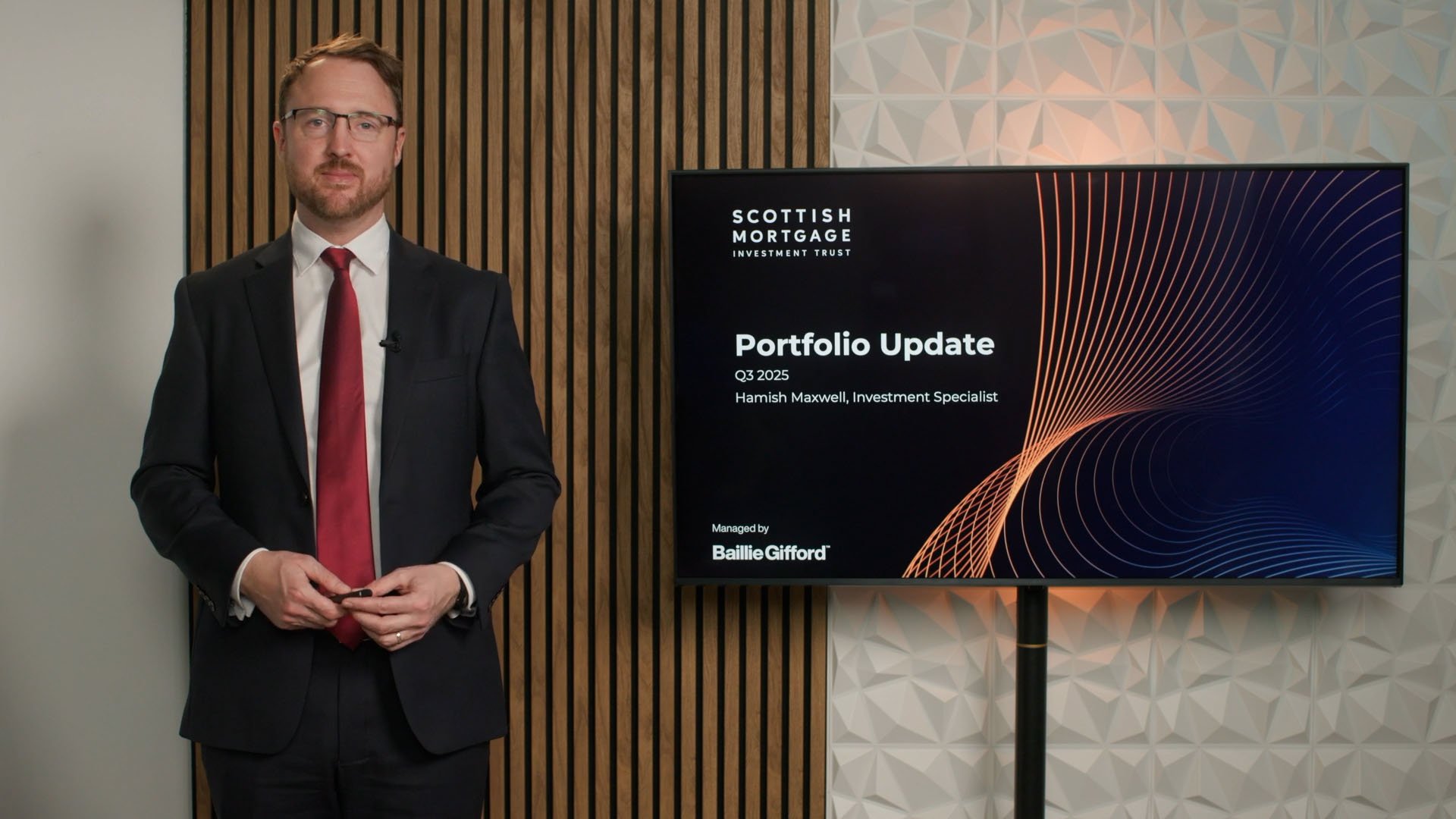Why Scottish Mortgage favours founder-led companies
Tom Slater – Manager, Scottish Mortgage
Key points
- Nearly 90 per cent of Scottish Mortgage portfolio companies are founder-led
- Company creators often have more capacity than non founders to push through radical change in rapidly shifting markets
- Founder leadership isn’t a cure-all or a must-have, but it often indicates a company aligned with our long-term goals

Most of us think of the Amazon Prime subscription service as a wonderful retention tool, bringing the best customers back again and again. That wasn’t always obvious. When Prime launched in 2005, Amazon was barely profitable. Yet here was a programme offering two-day delivery on unlimited items that suddenly turned the firm’s most profitable customers into its biggest loss-makers.
Along with many other lessons since we first invested that year, Amazon taught Scottish Mortgage a lot about the importance of founder-leaders. Jeff Bezos’s ability to focus on whatever created the most long-term value allowed him to use his authority as founder to make counterintuitive decisions.
Over nearly three decades, this allowed him to push through change despite the opposition of many around him. His successor, Andy Jassy, is matching that power, thanks to having led its Amazon Web Services cloud computing division since its inception.
Looking for the long-term thinkers
For us, the critical point is to find leaders running businesses for the long term who can escape the market’s focus on earnings over the next one or two quarters. Doing so lets them make decisions in investors’ best long-term interests.
Without our intending it – or even initially tracking it – the founder-leader factor has grown in importance within the portfolio. Today, nearly nine in 10 of our companies are founder-led: from Peter Carlsson at battery maker Northvolt to Marcos Galperin at ecommerce and payment giant MercadoLibre to the Collison brothers at payment processor Stripe.
Is there such a thing as an archetypical founder? Not exactly. There are different nuances in different parts of the world. But whether it’s in the US, Europe or China, we see the same sense of personal ownership and responsibility for what happens in the business, an urgency to get things done and an unwillingness to let bureaucracy get in the way of the company’s mission.

It’s hard for professional managers to match that sense of priority and to make transformative decisions that push the whole organisation to change. Not least because their incentives are often a performance bonus tied to earnings.
You can do all sorts of things to a business to boost short-term performance, including cutting your spending on research and development and marketing. But that can be very damaging to long-run outcomes. We like management teams that invest in the brand and optimise performance over a 10-year time horizon.
Getting it done
A strong founder-leader can take radical decisions to make sure change happens. This is important in a market environment that’s constantly shifting, both in terms of technology and consumer tastes. Against that background, stasis can be very damaging. Ambition and adaptability become vital.
Take Shopify: the ecommerce software provider flourished during the Covid pandemic by helping small businesses compete against larger retailers. The firm then moved into delivery and logistics, a lower-margin business that the founder-leader Tobi Lütke described as a ‘side quest’ to its main mission.
Shopify has been loss-making for most of its history, but rising interest rates meant the cost of building and connecting logistics infrastructure increased. Adapting to this changing business environment, Lütke abruptly switched course in May 2023, selling Shopify Logistics and cutting the size of the business by 20 per cent.
The company moved towards generating more cash when borrowing costs were rising. It’s an example of a founder taking tough decisions to give the company flexibility to compete in a very different environment.
Continuity counts
In the past 20 years, it’s become more common for founders to lead their firms for longer. Part of the reason is that financial backers have become less likely to push them out to bring in the ‘grownups’, but it’s also because companies have grown more quickly under their creators’ tenure.
We like that they have skin in the game financially. This forces them to think about long-term value appreciation as a key barometer of success, aligning their goals with ours.
Founders make an impact at every stage of the company’s development, and often a business’s very existence comes down to its creator matching the strength of his or her idea with the will and ability to make it happen.
Typically, the founder factor becomes less important as the business approaches maturity, when you’re less likely to see such radical shifts in the product portfolio or the pace of change.
The prime example here is Apple. Since Steve Jobs died and Tim Cook took over, we arguably haven’t seen products that have had the impact of the iPhone. But in terms of dollars of value created, it’s been much larger under Cook than Jobs. So it’s not that businesses can’t continue to be successful after the founder goes, it’s just that they sometimes become less radical.
Alphabet is in the same category. Compared with co-founder Larry Page, Sundar Pichai hasn’t done anything particularly revolutionary, but the company continues to grow and is one of the biggest, most profitable businesses on earth.
No magic bullet
I should stress that having a founder-leader is no guarantee of success. There are plenty who haven’t worked out. The interplay between a business and its founders can often be problematic. Some founders are pushed out, and some businesses simply outgrow them.
You see that particularly in enterprise software – cloud-based applications that help businesses become more efficient. The founder might have built a useful tool or product, but the challenge in scaling that kind of business is going out and selling it to big organisations.
That involves a very different skillset around managing a sales force, managing relationships and all sorts of the more boring things that enterprises are interested in. So it may make perfect sense to bring in a different chief executive.
Scottish Mortgage looks for companies that are changing their industries, providing goods and services in new ways and answering unmet needs. These are not normal companies. When you have a mission like this, having talented individuals at the helm has been utterly crucial.
We’re not in thrall to the ‘cult of the founder’. After all, the Trust’s largest holding is the Dutch firm ASML, which makes the machines that manufacture semiconductor chips. It’s not founder-led.
Nor do we see the continued presence of a business’s original leader as a panacea to the many problems that growth businesses face. It’s simply that we see businesses that are founder-led playing an outsized part in creating the great companies of the future.
Risk factors
Investments with exposure to overseas securities can be affected by changing stock market conditions and currency exchange rates.
About the author - Tom Slater
Manager, Scottish Mortgage
Tom Slater is manager of Scottish Mortgage. He joined Baillie Gifford in 2000 and became a partner of the firm in 2012. Tom joined the Scottish Mortgage team as deputy manager in 2009, before assuming the role of Manager in 2015. Beyond that, he is the head of the US Equities team and a member of another long-term growth equity strategy. During his time at Baillie Gifford, Tom has also worked in the Developed Asia and UK Equity teams. Tom’s investment interest is focused on high-growth companies both in listed equity markets and as an investor in private companies. He graduated BSc in Computer Science with Mathematics from the University of Edinburgh in 2000.
Regulatory Information
This content was produced and approved at the time stated and may not have been updated subsequently. It represents views held at the time of production and may not reflect current thinking. Read our Legal and regulatory information for further details.
A Key Information Document is available by visiting our Documents page. Any images used in this content are for illustrative purposes only.
This content does not constitute, and is not subject to the protections afforded to, independent research. Baillie Gifford and its staff may have dealt in the investments concerned. The views expressed are not statements of fact and should not be considered as advice or a recommendation to buy, sell or hold a particular investment.
Baillie Gifford & Co and Baillie Gifford & Co Limited are authorised and regulated by the Financial Conduct Authority (FCA). The investment trusts managed by Baillie Gifford & Co Limited are listed on the London Stock Exchange and are not authorised or regulated by the FCA.
Baillie Gifford Asia (Hong Kong) Limited 柏基亞洲(香港)有限公司 (BGA) holds a Type 1 licence from the Securities and Futures Commission of Hong Kong to market and distribute Baillie Gifford’s range of collective investment schemes and closed-ended funds such as investment trusts to professional investors in Hong Kong.
Baillie Gifford Asia (Singapore) Private Limited (BGAS) is regulated by the Monetary Authority of Singapore as a holder of a capital markets services licence to conduct fund management activities for institutional investors and accredited investors in Singapore. BGA and BGAS are wholly owned subsidiaries of Baillie Gifford Overseas Limited, which is wholly owned by Baillie Gifford & Co.
Europe
Scottish Mortgage Investment Trust PLC (the “Company”) is an alternative investment fund for the purpose of Directive 2011/61/EU (the “AIFM Directive”). Baillie Gifford & Co Limited is the alternative investment fund manager (“AIFM”) of the Company and has been authorised for marketing to Professional Investors in this jurisdiction.
This content is made available by Baillie Gifford Investment Management (Europe) Limited (“BGE”), which has been engaged by the AIFM to carry out promotional activities relating to the Company. BGE is authorised by the Central Bank of Ireland as an AIFM under the AIFM Regulations and as a UCITS management company under the UCITS Regulation. BGE also has regulatory permissions to perform promotional, advisory and Individual Portfolio Management activities. BGE has passported its authorisations under the mechanisms set out in the AIFM Directive.
Belgium
The Company has not been and will not be registered with the Belgian Financial Services and Markets Authority (Autoriteit voor Financiële Diensten en Markten / Autorité des services et marchés financiers) (the FSMA) as a public foreign alternative collective investment scheme under Article 259 of the Belgian Law of 19 April 2014 on alternative collective investment institutions and their managers (the Law of 19 April 2014). The shares in the Company will be marketed in Belgium to professional investors within the meaning the Law of 19 April 2014 only. Any offering material relating to the offering has not been, and will not be, approved by the FSMA pursuant to the Belgian laws and regulations applicable to the public offering of securities. Accordingly, this offering as well as any documents and materials relating to the offering may not be advertised, offered or distributed in any other way, directly or indirectly, to any other person located and/or resident in Belgium other than to professional investors within the meaning the Law of 19 April 2014 and in circumstances which do not constitute an offer to the public pursuant to the Law of 19 April 2014. The shares offered by the Company shall not, whether directly or indirectly, be marketed, offered, sold, transferred or delivered in Belgium to any individual or legal entity other than to professional investors within the meaning the Law of 19 April 2014 or than to investors having a minimum investment of at least EUR 250,000 per investor.
Germany
The Trust has not offered or placed and will not offer or place or sell, directly or indirectly, units/shares to retail investors or semi-professional investors in Germany, i.e. investors which do not qualify as professional investors as defined in sec. 1 (19) no. 32 German Investment Code (Kapitalanlagegesetzbuch – KAGB) and has not distributed and will not distribute or cause to be distributed to such retail or semi-professional investor in Germany, this document or any other offering material relating to the units/shares of the Trust and that such offers, placements, sales and distributions have been and will be made in Germany only to professional investors within the meaning of sec. 1 (19) no. 32 German Investment Code (Kapitalanlagegesetzbuch – KAGB).
Luxembourg
Units/shares/interests of the Trust may only be offered or sold in the Grand Duchy of Luxembourg (Luxembourg) to professional investors within the meaning of Luxembourg act by the act of 12 July 2013 on alternative investment fund managers (the AIFM Act). This document does not constitute an offer, an invitation or a solicitation for any investment or subscription for the units/shares/interests of the Trust by retail investors in Luxembourg. Any person who is in possession of this document is hereby notified that no action has or will be taken that would allow a direct or indirect offering or placement of the units/shares/interests of the Trust to retail investors in Luxembourg.
Switzerland
The Trust has not been approved by the Swiss Financial Market Supervisory Authority (“FINMA”) for offering to non-qualified investors pursuant to Art. 120 para. 1 of the Swiss Federal Act on Collective Investment Schemes of 23 June 2006, as amended (“CISA”). Accordingly, the interests in the Trust may only be offered or advertised, and this document may only be made available, in Switzerland to qualified investors within the meaning of CISA. Investors in the Trust do not benefit from the specific investor protection provided by CISA and the supervision by the FINMA in connection with the approval for offering.
Singapore
This content has not been registered as a prospectus with the Monetary Authority of Singapore. Accordingly, this content and any other content or material in connection with the offer or sale, or invitation for subscription or purchase, of the Trust may not be circulated or distributed, nor may be offered or sold, or be made the subject of an invitation for subscription or purchase, whether directly or indirectly, to persons in Singapore other than (i) to an institutional investor (as defined in Section 4A of the Securities and Futures Act 2001, as modified or amended from time to time (SFA)) pursuant to Section 274 of the SFA, (ii) to a relevant person (as defined in Section 275(2) of the SFA) pursuant to Section 275(1), or any person pursuant to Section 275(1A), and in accordance with the conditions specified in Section 275 of the SFA, or (iii) otherwise pursuant to, and in accordance with the conditions of, any other applicable provision of the SFA.
Where the Trust is subscribed or purchased under Section 275 by a relevant person which is:
(a) a corporation (which is not an accredited investor (as defined in Section 4A of the SFA)) the sole business of which is to hold investments and the entire share capital of which is owned by one or more individuals, each of whom is an accredited investor; or
(b) a trust (where the trustee is not an accredited investor) whose sole purpose is to hold investments and each beneficiary of the trust is an individual who is an accredited investor, securities or securities-based derivatives contracts (each term as defined in Section 2(1) of the SFA) of that corporation or the beneficiaries’ rights and interest (howsoever described) in that trust shall not be transferred within six months after that corporation or that trust has acquired the securities pursuant to an offer made under Section 275 except:
(1) to an institutional investor or to a relevant person or to any person arising from an offer referred to in Section 275(1A) or Section 276(4)(c)(ii) of the SFA,
(2) where no consideration is or will be given for the transfer;
(3) where the transfer is by operation of law; or
(4) pursuant to Section 276(7) of the SFA or Regulation 37A of the Securities and Futures (Offers of Investments) (Securities and Securities-based Derivatives Contracts) Regulations 2018.







